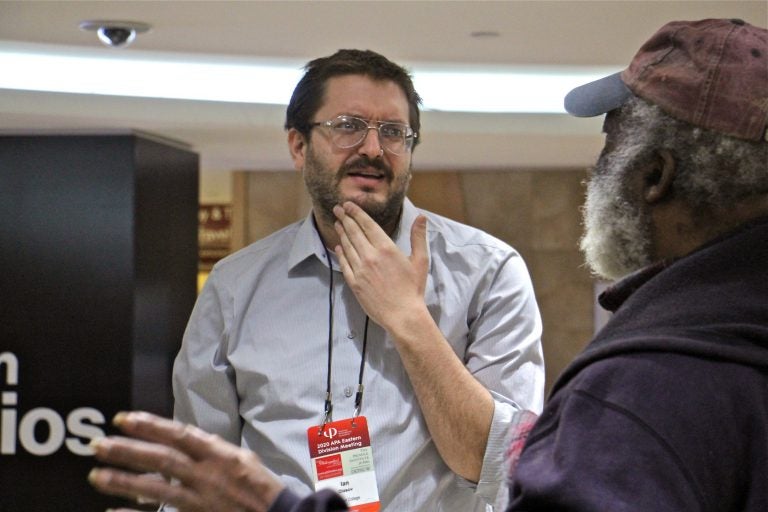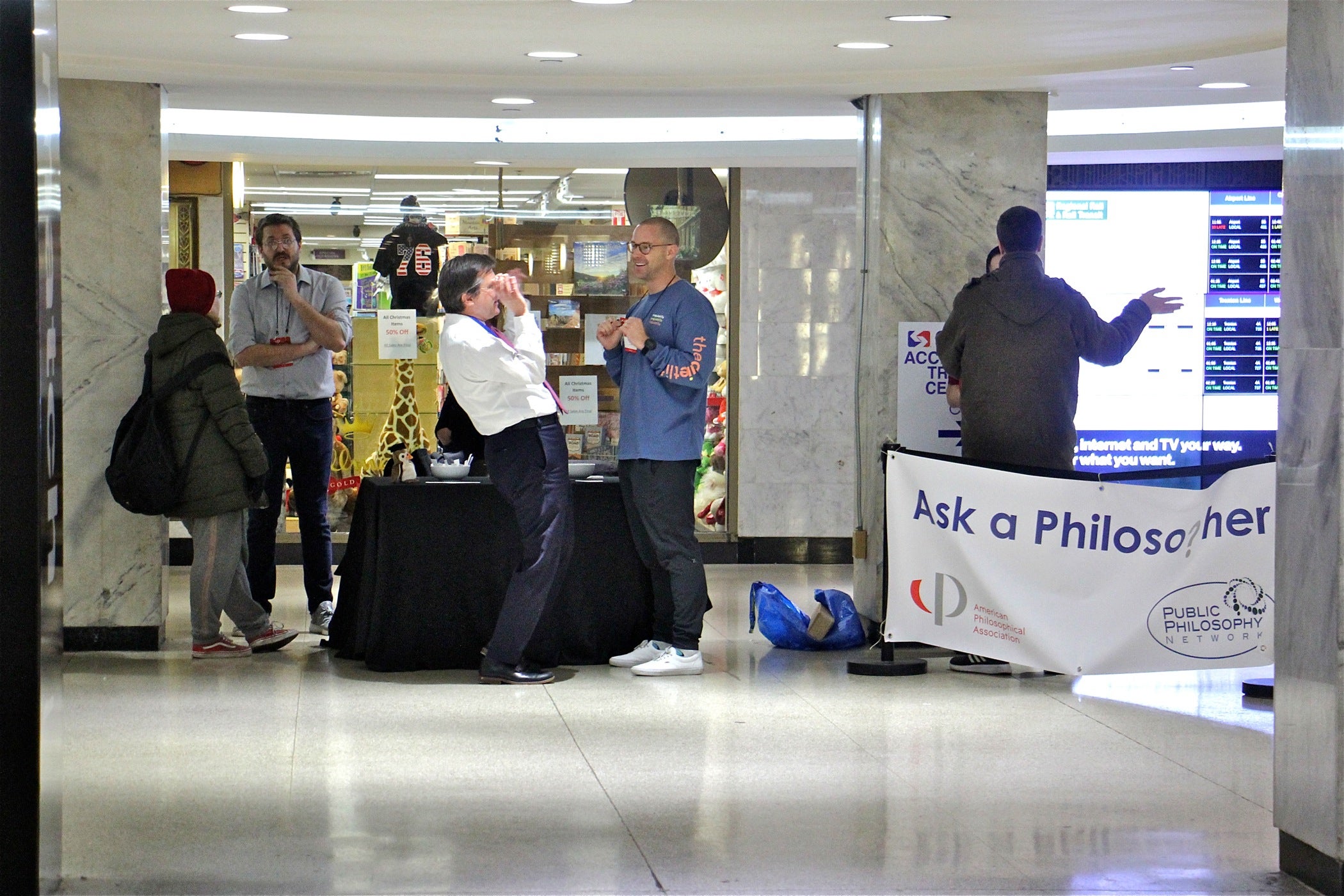Commuters ponder deep questions with philosophers at Suburban Station
The Ask a Philosopher table appears daily at Suburban Station this week while the American Philosophical Association conference is in Philadelphia.

Ian Olasov (left), a part-time philosophy professor at Brooklyn College, engages with passersby at the Ask a Philosopher pop-up booth at Suburban Station in Center City. (Emma Lee/WHYY)
Two flute players busking for change down in the concourse of SEPTA’s Suburban Station in Philadelphia created the perfect soundtrack for considering a philosophical matter.
Say there are three kids, each making a claim for the same flute. The first child can play the flute. We don’t know if she takes pleasure in playing, but at least she is able.
The second child cannot play the flute but has no other toys. He won’t make music with the flute, however, he will take pleasure in it as a plaything.
The third child says the flute should be hers because she made it.
Who should have the flute?
“Is it a piece of property? Or do we want the claim for the one who can utilize it — the utilitarian theory? Or, do we want to be charitable?” pondered Joseph Fontak, an attorney on his way to an appointment downtown.
He spared a few minutes to stop at the Ask a Philosopher table and muse on the hypothetical question.
“Certainly, it is a good use of our time,” said Fontak. “You know, life is hard and we have to spend time making a living and feeding our family, but it’s nice to get into the deeper aspects.”
Ask a Philosopher, an idea born in Brooklyn, is visiting Philadelphia for the duration of the annual American Philosophical Association conference at the Pennsylvania Convention Center, or until Saturday.

“It’s important for philosophers to find out about what problems preoccupy everyone else,” said Ian Olasov, an adjunct professor of philosophy at Brooklyn College who created the idea of Ask a Philosopher.
With support from the Philosophical Association, Olasov set up a table at farmer’s markets in Brooklyn in 2016 to engage passersby with deep questions that do not have easy answers.
On the black tablecloth of a folding card table are three bowls. The first contains thought experiments, like the flute scenario, typed on slips of paper. The second bowl has questions, such as, “If you could live forever, would you?” and “If you play the lottery, do you know you are going to lose?”
The third bowl has candy. Nothing starts a conversation like candy.
The bowls are meant to spark discussion for people who are curious but did not come to the table with a question in mind. Other people don’t need a question prompt, they come ready for answers.
Philosophy often does not provide answers. It’s better at offering ways to approach questions.
“This is something that comes up often with the public and even other disciplines in academia, that philosophy is bad at producing answers. I think that misses the point,” said Vincent Andreassi, a philosophy undergraduate at Brooklyn College who sometimes staffs the table.
“At least some of the valuable functions of philosophy are to yield different perspectives,” he said. “The way we are thinking about these questions, we provide answers that are more coherent. We examine our premises that lead to conclusions.”
One visitor to the Ask the Philosophy table came seeking concrete financial advice: What should I invest money in?
For that person, Olasov described a perspective from Confucius, the ancient Chinese philosopher, who theorized that the concept of buying low and selling high — i.e., an investment — was the lowest form of economic activity, below other forms like producing goods or services.
An open-ended discussion commenced about money, values and responsibility.
“We went from a pretty non-philosophical starting point to philosophy within a couple minutes,” said Olasov. “It doesn’t take long to find a road back to philosophy.”
Philosophical questions are not always appropriate for casual socializing. Olasov said nobody wants to be a party-killer by asking things like: Are people morally obligated to donate their organs when they die? Are we better off giving charitably overseas, or at home? Is there a value in love if it drives us to bad behaviors?
Those were all questions posed by people stopping at the table, sometimes urgently wanting a discussion for which they had no other opportunity.
This is the first time Olasov has taken his Ask a Philosopher table outside New York. He posited that, based on his experience in Suburban Station, Philadelphians are friendlier than New Yorkers.
Discuss.
WHYY is your source for fact-based, in-depth journalism and information. As a nonprofit organization, we rely on financial support from readers like you. Please give today.





